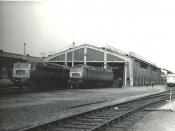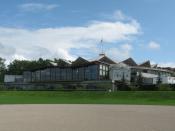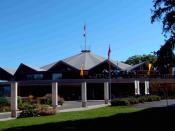"July 13, 1953, was...'the most exciting night in the history of Canadian theatre.'...the atmosphere was electrifying." Originally the idea of Thomas Patterson, a man who had seen plays in Europe as a soldier in WWII, he found that the in a comparison between theatre in Canada and theatre in Europe, there was none. There were no permanent theatres in Canada, and he determined to do something about it. Partly to boost his hometown's economy, and partly the efforts to bring artistic culture there, Patterson began the efforts of transforming the town into a cultural centre. After much hard work, the Stratford Theatre Festival blossomed into a national event. The development of the Stratford Theatre Festival shows that the "arts" can be a viable economic enterprise, while benefiting the community, local and national, in enriching cultural ways.
In the 1940s and 50s, many Canadians felt threatened by Canada's cultural dependence on the United States.
This was not only a feeling that Canadians and Canadian culture should be more independent, but some Canadian officials felt that American media "bred passive, uncritical audiences susceptible to manipulation." The feeling that Canadian arts were so dominated by their American counterparts sparked a fever of nationalism. The Royal Commission on National Development in the Arts, Letters and Sciences was established in 1949 to evaluate and recommend solutions to this problem of American influence and other problems plaguing theatres, radio, book-writing and others. The main belief of the Commission was that self-improvement (of Canadians in general) was achieved through culture. "Culture [provides] a means of cultivating... independent, critically minded citizens who [are] required to make [Canada] work." The efforts of the Royal Commission, or the Massey Report, culminated in the implementation of the Canada Council, designed to be an arts funding agency, in 1957.
Also in 1957,


